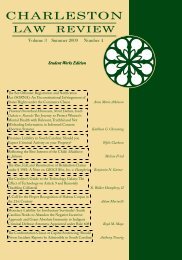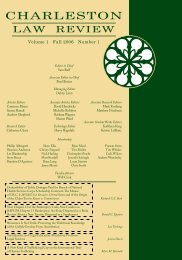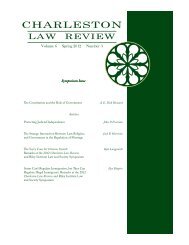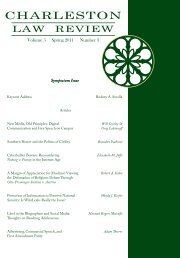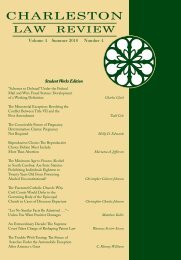Volume 5 Winter 2011 Number 2 - Charleston Law Review
Volume 5 Winter 2011 Number 2 - Charleston Law Review
Volume 5 Winter 2011 Number 2 - Charleston Law Review
Create successful ePaper yourself
Turn your PDF publications into a flip-book with our unique Google optimized e-Paper software.
SCHULZE FINAL.doc1/20/<strong>2011</strong> 6:14PM<strong>2011</strong>] <strong>Law</strong> School Academic Supportare working or learning in a manner of their own choice(autonomy); they are good at what they do or at least can becomegood at it (competence); and their work or learning has purposeand allows them to relate meaningfully to others (relatedness). 111All three of these factors of SDT are relevant to legal education,but autonomy support seems to provide the most fertile groundfor result-oriented law school pedagogical reform. This will bediscussed further below.Regarding SDT, in a recent study of the impact of externallyprovided motivation for learners, Dr. Hyungshim Jangdemonstrated the importance of this concept. 112 One hundredthirty-six undergraduate students were given a relativelyuninteresting lesson for twenty minutes. 113 Some received arationale for the lesson, others did not. 114 Those whoreceived a rationale prior to the lesson showed “greateridentified regulation, interest-enhancing strategies, behavioralengagement, and conceptual learning.” 115 Therefore, connectingstudents to an understanding of why they must learn using themethod chosen actually results in better learning. 116111. Kennon M. Sheldon & <strong>Law</strong>rence S. Krieger, Understanding theNegative Effects of Legal Education on <strong>Law</strong> Students: A Longitudinal Test ofSelf-Determination Theory, 33 PERSONALITY &SOC. PSYCHOL. BULL. 883, 885(2007), available at http://www.immagic.com/eLibrary/ARCHIVES/GENERAL/SAGEP_UK/S070504S.pdf.112. Hyungshim Jang, Supporting Students’ Motivation, Engagement, andLearning During an Uninteresting Activity, 100 J. EDUC. PSYCHOL. 798, 798(2008), available at http://psycnet.apa.org/index.cfm?fa=main.doiLanding&uid=2008-16034-006.113. Id.114. Id.115. Id.116. See Emily Zimmerman, An Interdisciplinary Framework forUnderstanding and Cultivating <strong>Law</strong> Student Enthusiasm, 58 DEPAUL L. REV.851, 886–88 (2009) (noting a general shift in students’ motivations during thedisorienting first year of law school). Self-determination theorists’ solution tothis age-old dilemma would be to demystify the process. Sheldon & Krieger,supra note 111, at 884. A student swimming in a sea of disconnectedness wouldlearn the material better if someone simply explained that, by reading the case,you are forced to learn the legal analytical method of arguing two sides of alegal problem. Id. While indirectly learning the substance of the law fromreading the case, you also learn the dialectical process of the law by reading thecourt’s analysis of both parties’ arguments. Boyle, supra note 38, at 14–15.Rather than alienating large swaths of a class, self-determination theorists301



